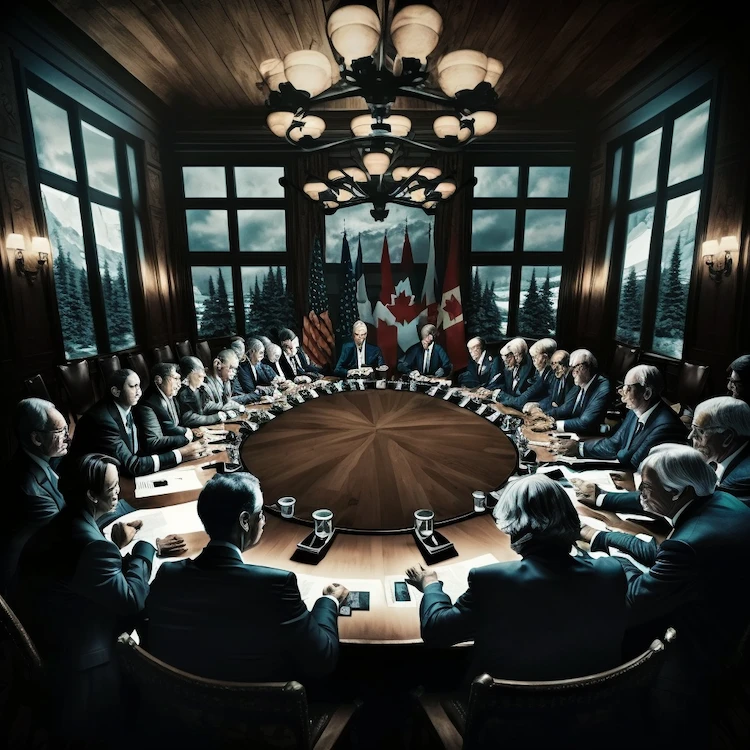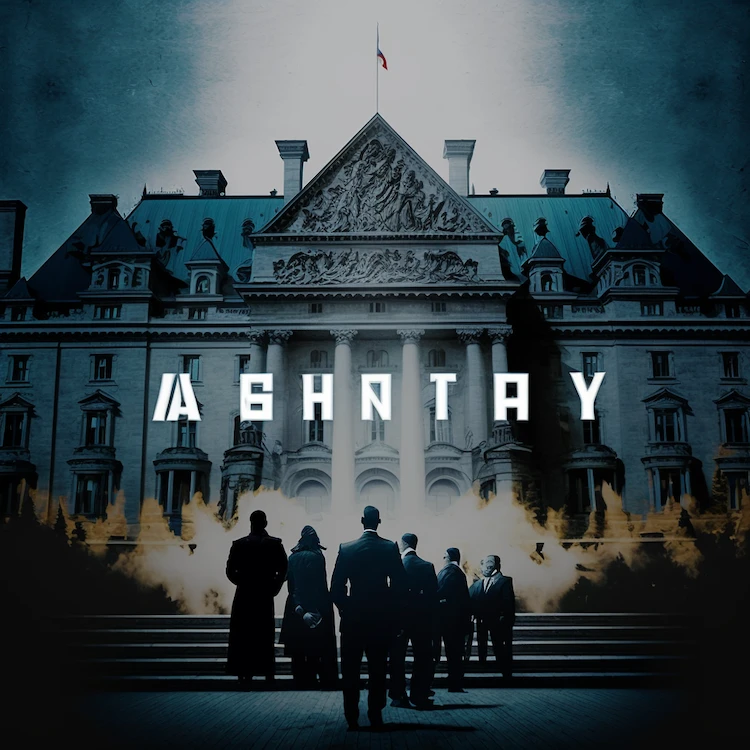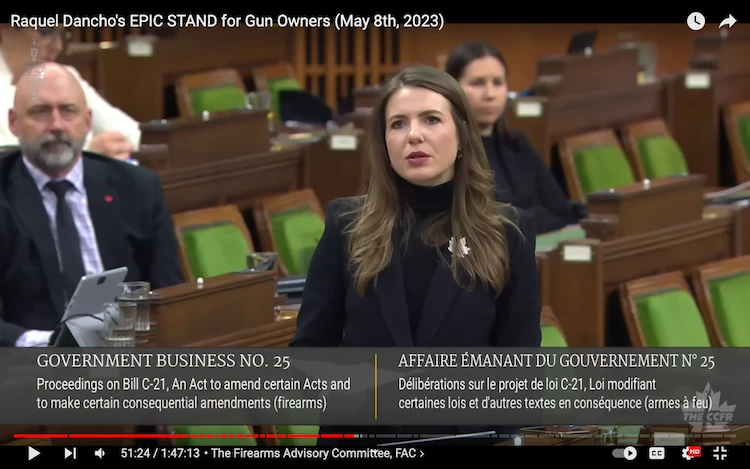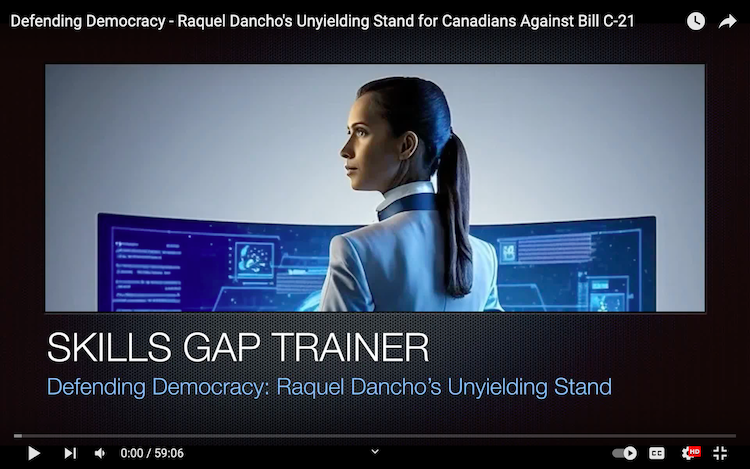Video: Raquel Dancho’s EPIC STAND for Gun Owners (May 8th, 2023)
YouTube Link: https://youtu.be/LsVfn6AThn0
Video: Defending Democracy – Raquel Dancho’s Unyielding Stand for Canadians Against Bill C-21
YouTube Link: https://youtu.be/Bf2LUyLH_es
Description: A report outlining a few “small” issues relating to Bill C-21.

Table Of Contents
Introduction
1: Bill C-21 and its Detrimental Impact on Lawful Firearms Owners
- 1.1 Misrepresentation of Firearms
- 1.2 Unfair Implications for Rural Canadians
- 1.3 Distrust in the Implementation
2: Critique of the Government’s Approach to the Bill
- 2.1 Lack of Transparency and Consultation
- 2.2 Selective Use of Data and Experts
- 2.3 Inconsistency in Rhetoric and Policy
3: Advocacy for Responsible Gun Ownership and Alternatives to Bill C-21
- 3.1 Support for Existing Gun Control Measures
- 3.2 Call for Focus on Criminal Activity
- 3.3 Investment in Other Public Safety Measures
Conclusion

Introduction
In the vibrant landscape of Canadian political discourse, there exists a contentious topic that has provoked fervent debate and sharp division: Bill C-21. This piece of legislation, aimed at firearm control, has drawn the ire of a significant portion of the population, particularly those who rely on firearms as part of their everyday life. A voice that resonates with this dissent is that of Member of Parliament, Raquel Dancho. Dancho’s impassioned discourse on the issue, as seen in her speech, “Raquel Dancho’s EPIC STAND for Gun Owners (May 8th, 2023),” released on the CCFR YouTube channel, dissects the controversial Bill C-21, highlighting its flaws and presenting a compelling argument against its implementation.
Dancho’s critique focuses on three main facets: the detrimental impact on lawful firearms owners, the government’s approach to the bill, and the advocacy for responsible gun ownership and alternatives to the proposed legislation. She fearlessly challenges the categorization of hunting rifles as “military-style assault weapons,” calls out the disproportionate implications for rural Canadians, and questions the bill as a clandestine means of firearm registration. Further, Dancho critiques the government’s lack of transparency and consultation, its selective use of data and experts, and the inconsistencies between rhetoric and policy in their approach to the bill.
Moreover, Dancho doesn’t merely present problems; she proposes solutions, affirming the effectiveness of existing gun control measures and advocating for a focus on criminal activity. She makes a resounding call for the better allocation of taxpayer dollars to other public safety measures, emphasizing the need to enforce existing firearms prohibition orders, strengthen border control, and combat drug trade and gang activity.
As we delve into Dancho’s powerful stand, we’ll unravel her key points and the implications they carry for the Canadian public. While we share the objective of public safety and reducing gun violence, Dancho’s argument challenges us to consider whether the path proposed by Bill C-21 is the right one, and if a reassessment of the legislation is required for a more effective, fair, and widely accepted firearms policy. As we embark on this exploration, remember: the crux of this debate isn’t about demonizing or glorifying firearms; rather, it’s about finding a balanced, equitable approach that respects the rights and realities of all Canadians. So, let’s dive in.

Section 1: Bill C-21 and its Detrimental Impact on Lawful Firearms Owners
1.1 Misrepresentation of Firearms
Throughout her discussion on Bill C-21, Raquel Dancho fervently asserts that the proposed legislation inaccurately categorizes conventional hunting rifles as “military-style assault weapons.” This, she argues, is not only misleading but also leads to needless restrictions on firearms typically used for legal and peaceful purposes, such as hunting and sport shooting.
A significant part of Dancho’s critique comes from the bill’s perceived lack of precision in defining what constitutes a “military-style assault weapon.” She expresses concern that the bill’s broad definition could classify firearms used for hunting and sport shooting as assault weapons. An example she gives is the Mini-14, a semi-automatic rifle commonly used for varmint hunting and sports shooting. By the proposed legislation’s definition, the Mini-14 could potentially fall into the category of “military-style assault weapons,” thereby becoming subjected to the bill’s restrictions. However, its prevalent use for hunting and sport challenges this classification.
In addition to potential confusion, the misrepresentation of firearms in the bill is seen as leading to unnecessary restrictions on lawful firearms owners. This is because many individuals use these firearms responsibly for hunting and sport. Imposing restrictions on these firearms, as Dancho argues, may limit the activities of lawful owners unnecessarily and unjustly.
Furthermore, Dancho suggests that this categorization of hunting rifles as assault weapons is not based on their functionality or their potential for misuse but rather on their aesthetic features. She underscores that the legislation does not clearly differentiate between the functional features of a firearm that would classify it as an assault weapon and the purely aesthetic features, creating ambiguity and potentially leading to unfair restrictions.
Overall, Dancho contends that this misrepresentation and broad categorization of firearms, such as hunting rifles, under the umbrella of “military-style assault weapons” serves to stigmatize and unjustly restrict the activities of law-abiding firearms owners, without necessarily enhancing public safety. Her argument underscores the need for precision and fairness in any legislation that seeks to regulate firearms use.
Leadership Lessons Learned:
“Raquel Dancho, a defender of Canadians and their rights, brings forward a comprehensive critique of Bill C-21, examining its potential impact on lawful firearm owners, and questioning the government’s approach to the Bill. Her critique offers more than just an analysis of a specific piece of legislation; it provides valuable insights into the principles of strategic leadership, the importance of empathy, and the significance of evidence-based policy.”
“In her detailed critique of Bill C-21, Raquel Dancho displays exemplary strategic leadership as she addresses the issue of misrepresentation of firearms in the proposed legislation. Her approach showcases her in-depth understanding of the issues at hand and a keen strategic foresight, both essential traits of effective leadership.”
“Dancho identifies and publicly questions the bill’s categorization of common hunting rifles as “military-style assault weapons.” In this, she shows the courage and sincerity necessary to challenge a prevailing narrative, an attribute that aligns with the warrior ethos of standing up for what one believes in, even in the face of adversity.”
“Her strategic approach to addressing this misrepresentation extends to leveraging evidence and expert opinions. She uses credible research and insights from experts in the field to lend weight to her arguments, reflecting her commitment to an evidence-based policy.”
“Furthermore, Dancho’s leadership approach to this misrepresentation issue showcases her strong organizational skills. She systematically critiques the erroneous classification, offering viable alternatives and solutions. This is reminiscent of effective project management, an attribute that transcends industries and is a cornerstone of effective leadership.”
“In focusing on the misrepresentation issue, Dancho also demonstrates empathy and a deep connection with her constituents. She understands that the inaccurate classification of firearms impacts rural Canadians who rely on such rifles for hunting and protection from wildlife. This concern for her constituents highlights her emotional intelligence, a key trait of a successful leader.“
“Lastly, Dancho’s critique of the bill’s misrepresentation of firearms exemplifies her advocacy for transparency. She calls out the bill’s lack of clarity and its potential to sow confusion and mistrust among lawful firearms owners. This insistence on transparency reflects the principles of democratic leadership and emphasizes her commitment to fair and inclusive legislation.”
“In summary, Raquel Dancho’s critique of the misrepresentation of firearms in Bill C-21 showcases her strategic leadership approach. Her courage, sincerity, commitment to evidence-based policy, project management skills, emotional intelligence, and advocacy for transparency are clearly demonstrated, offering valuable leadership lessons for those looking to make a stand in their respective fields.”
1.2 Unfair Implications for Rural Canadians
An integral aspect of Dancho’s critique of Bill C-21 centers around the potential disproportionate effect on rural Canadians, who, as she articulates, rely on firearms as essential tools in their daily lives. From hunting for sustenance to protecting themselves from wildlife, the rural population’s dependency on firearms is vastly different from urban settings where firearms are seen less as tools and more as potential threats to safety.
Firstly, Dancho underscores that firearms, especially hunting rifles, are indispensable tools for many rural Canadians. They use these firearms for hunting, which is not just a sport but a way of life, often tied to sustaining their families. The broad and undefined categorization of firearms as “military-style assault weapons” under Bill C-21 could inadvertently ban hunting rifles, thereby jeopardizing this significant aspect of rural life.
Secondly, the necessity of firearms in rural areas extends to protecting oneself and one’s property from potential wildlife threats. Dancho points out that urban residents, legislators, and policymakers often overlook this aspect, resulting in a law that may seem reasonable in an urban context but proves problematic and impractical in rural settings.
Moreover, she expresses that Bill C-21 could detrimentally affect the competitiveness of Canadian athletes on the global stage in sport shooting events. She suggests that the bill’s restrictions may prohibit sports shooting, particularly with pistols, further reinforcing the disproportionate impact of the legislation on communities that engage in such sports activities.
In conclusion, Dancho’s discussion on the potential repercussions of Bill C-21 on rural Canadians underscores a fundamental flaw in the proposed legislation – the lack of understanding and consideration of the different uses and significance of firearms in varied demographic and geographic contexts. She emphasizes that for rural Canadians, firearms are not merely weapons, but tools and a way of life, and any legislation governing their use should take these differences into account.
Leadership Lessons Learned:
“Raquel Dancho demonstrates a profound understanding of the potential effects of Bill C-21 on rural Canadians, showing empathy and a strong connection with her constituents. This emotional intelligence is critical in effective leadership, helping to build trust, mutual respect, and understanding.“
“In her critique of Bill C-21, Dancho constantly emphasizes the unfair burden that the bill places on rural Canadians. These citizens, she argues, often rely on the very firearms that the bill seeks to categorize as “military-style assault weapons” for hunting and protection from wildlife. She shows a deep understanding of her constituents’ lifestyle and needs, which informs her stand against the bill.“
“Dancho’s stand against Bill C-21 illustrates the virtues of courage and sincerity, widely celebrated in warrior ethos. By openly criticizing the government’s approach and standing for the rights and interests of rural Canadians, she shows her willingness to face potential political risks. This ability to put the needs of her constituents before her own highlights her sincerity and commitment.”
“In addressing the bill’s unfair implications for rural Canadians, Dancho demonstrates her commitment to evidence-based policy. She invokes credible research to support her arguments, underscoring her dedication to informed decision-making. She uses research from Dr. Caillin Langmann to illustrate the lack of correlation between gun ownership and gun crime, emphasizing how the bill unfairly targets law-abiding firearms owners.“
“Dancho’s call for greater transparency and consultation in the crafting of firearms legislation is a significant component of her critique. She insists that any laws affecting rural Canadians should include their perspectives. This advocacy for inclusivity and fairness aligns with the principles of democratic leadership, suggesting that effective leadership often involves giving a voice to those who might otherwise be overlooked.“
“In conclusion, Raquel Dancho’s critique of Bill C-21’s impact on rural Canadians showcases her deep empathy for her constituents and her understanding of the unfair implications of the bill. Her stand embodies strategic leadership, courage, evidence-based policy, and a commitment to transparency, offering important lessons for leadership and advocacy.”
1.3 Distrust in the Implementation
A significant point in Dancho’s analysis of Bill C-21 is her deep-seated concern regarding the legislation’s implementation. She exhibits suspicion about the potential clandestine nature of the bill, especially regarding its potential role as a “backdoor” way of registering firearms, thereby fostering mistrust among firearms owners, which could consequently lead to widespread noncompliance.
Dancho points out that the transparency issues around the legislation feed into the widespread sentiment of mistrust. She highlights the Liberals’ seeming disregard for firearm owners’ perspectives during the consultation phase and their tendency to downplay the bill’s potential impact on lawful firearm owners. These issues contribute to a climate of skepticism, with owners feeling that they are being systematically excluded and potentially penalized.
Moreover, the perceived opacity around the “grandfathering clause” in Bill C-21 further exacerbates this mistrust. The clause apparently allows owners to retain and even sell firearms that would be newly classified under the bill. However, Dancho suggests that the Liberals’ rhetoric around firearms as “weapons of war” indicates an inconsistency in their stance, potentially signifying an ulterior motive. This incongruity, in her opinion, adds another layer of confusion and suspicion among firearm owners.
Furthermore, Dancho expresses concern about the bill’s potential repercussions for lawful firearm owners who may be unintentionally non-compliant with the new, arguably unclear, legislation. She underscores that Bill C-21 might inadvertently criminalize law-abiding citizens and instill a climate of fear and apprehension.
Overall, Dancho’s critique underscores a significant potential challenge to Bill C-21’s implementation – the growing mistrust among lawful firearm owners, stemming from perceived opacity and inconsistencies in the legislation. She emphasizes that the success of any such law would require the cooperation and compliance of firearms owners, which hinges critically on their trust in the government’s intent and transparency.
Additionally, her demand for more open dialogue and consultation in the formation of firearms legislation reflects her dedication to democratic principles. In calling for more transparency, she is actively working to mitigate the power imbalance between the government and its citizens, promoting a more fair and balanced approach.
Moreover, Dancho’s argument is grounded in a commitment to evidence-based policy. She presents data and references credible research to substantiate her concerns, illustrating the importance of informed decision-making in leadership.
Her stand against the potential covert registration of firearms demonstrates courage and sincerity, core attributes in the ethos of a warrior leader. Despite the potential political risks, Dancho is willing to voice these concerns openly, defending the rights and interests of her constituents.
In conclusion, Dancho’s critique of Bill C-21’s implementation provides valuable insights into power dynamics and the need for transparency in governance. Her strategic leadership, courage, and commitment to evidence-based policy are all on display as she navigates these complex issues, providing an important example of effective leadership in the political sphere.
Leadership Lessons Learned:
“This perspective exemplifies Dancho’s comprehension of how power can be manipulated to control narratives and implement agendas. By identifying and challenging this potential misuse of power, Dancho is taking a stand not only against the specifics of Bill C-21 but also against the broader issue of government overreach and lack of transparency.”
“Raquel Dancho’s critique of Bill C-21’s implementation reveals a deep understanding of power dynamics and suspicion of the potential misuse of this power. Such awareness is a critical aspect of strategic leadership, particularly in the complex political arena.“
“Throughout her analysis, Dancho expresses strong distrust in the bill’s proposed implementation process, particularly regarding its implications for the covert registration of firearms. She articulates her suspicion that the bill, under the guise of promoting public safety, might actually be used to create a “backdoor registry” of firearms, an action that would infringe upon the rights and privacy of lawful firearms owners.”
“Raquel Dancho demonstrates a profound understanding of the potential effects of Bill C-21 on rural Canadians, showing empathy and a strong connection with her constituents. This emotional intelligence is critical in effective leadership, helping to build trust, mutual respect, and understanding.“
“In her critique of Bill C-21, Dancho constantly emphasizes the unfair burden that the bill places on rural Canadians. These citizens, she argues, often rely on the very firearms that the bill seeks to categorize as “military-style assault weapons” for hunting and protection from wildlife. She shows a deep understanding of her constituents’ lifestyle and needs, which informs her stand against the bill.“
“Dancho’s stand against Bill C-21 illustrates the virtues of courage and sincerity, widely celebrated in warrior ethos. By openly criticizing the government’s approach and standing for the rights and interests of rural Canadians, she shows her willingness to face potential political risks. This ability to put the needs of her constituents before her own highlights her sincerity and commitment.”
“In addressing the bill’s unfair implications for rural Canadians, Dancho demonstrates her commitment to evidence-based policy. She invokes credible research to support her arguments, underscoring her dedication to informed decision-making. She uses research from Dr. Caillin Langmann to illustrate the lack of correlation between gun ownership and gun crime, emphasizing how the bill unfairly targets law-abiding firearms owners.“
“Dancho’s call for greater transparency and consultation in the crafting of firearms legislation is a significant component of her critique. She insists that any laws affecting rural Canadians should include their perspectives. This advocacy for inclusivity and fairness aligns with the principles of democratic leadership, suggesting that effective leadership often involves giving a voice to those who might otherwise be overlooked.”
“In conclusion, Raquel Dancho’s critique of Bill C-21’s impact on rural Canadians showcases her deep empathy for her constituents and her understanding of the unfair implications of the bill. Her stand embodies strategic leadership, courage, evidence-based policy, and a commitment to transparency, offering important lessons for leadership and advocacy.”

Section 2: Critique of the Government’s Approach to the Bill
2.1 Lack of Transparency and Consultation
Throughout her discourse, Dancho persistently critiques the government’s approach towards Bill C-21, underscoring the perceived lack of transparency and consultation with the relevant stakeholders. This has seemingly resulted in legislation that is out of sync with the realities and needs of lawful firearm owners.
Dancho alleges that the government failed to conduct a comprehensive and unbiased consultation process before proposing the bill. She argues that this absence of open discussion and information sharing has left a significant portion of Canadian society—firearm owners—feeling overlooked and misrepresented in legislative decision-making processes.
She further points out that the lack of consultation extends to crucial stakeholders, including the provinces, territories, Indigenous leaders, and rural Canadians who constitute a substantial segment of lawful firearm owners. In this regard, she argues that the legislation appears to be more of a unilateral imposition rather than a democratically negotiated solution.
Moreover, Dancho points out that the dearth of transparency in the bill’s development process makes it difficult for Canadians to fully understand and trust the proposed legislation. She contends that this lack of transparency manifests in the government’s inability to answer critical questions regarding the bill’s rationale and potential effects. For instance, questions around the practicality and enforcement of the new regulations remain unanswered, which further contributes to an atmosphere of mistrust and skepticism.
Dancho concludes this part of her critique by highlighting the risk that this non-transparent approach poses to public confidence in legislative processes. She warns that such processes could potentially alienate firearms owners, driving them away from compliance and cooperation, thereby undermining the overall objective of enhancing public safety. Thus, she underscores the need for a more open, consultative, and transparent approach in the formulation of firearm policies.
Leadership Lessons Learned:
“Raquel Dancho’s critique of Bill C-21 is not limited to the specifics of the bill itself but also extends to the government’s approach in developing and promoting the bill, particularly in terms of transparency and consultation.“
“Dancho continually advocates for a more transparent process and calls for greater consultation in the formation of legislation. This reflects a core principle of democratic leadership: inclusivity. She underscores the importance of involving relevant stakeholders, such as lawful firearms owners, experts, and communities directly impacted by the bill, in the policymaking process. By doing so, she is not only challenging the way the bill was designed but also promoting a more inclusive, participatory approach to legislation.“
“This focus on consultation and transparency also reflects a deep understanding of power dynamics and a commitment to balance power relationships. By advocating for the voices of those potentially marginalized by the bill, she is working to mitigate the power imbalance between the government and its citizens, ensuring all voices are heard.“
“Her advocacy also demonstrates her empathy and connection with her constituents. Her concern for the impact of Bill C-21 on rural Canadians illustrates her deep understanding of the communities she represents and her commitment to protect their interests.“
“Dancho’s insistence on greater transparency and consultation is not only a critique of the government’s approach to Bill C-21 but also an important demonstration of democratic leadership. Her vocal support for a more open, inclusive process aligns with the principles of effective leadership and offers an example of how leaders can stand up for their constituents and challenge the status quo in the pursuit of fairness and justice.”
2.2 Selective Use of Data and Experts
In Dancho’s critique, she raises a significant accusation towards the government, charging them with a selective use of data and experts to push forward the narrative they find most suitable for their agenda. This tactic, according to her, neglects other credible sources of data and undermines a holistic, balanced approach to understanding the complexity of firearms legislation and its potential impacts.
Dancho highlights the work of Dr. Caillin Langmann as an example of such overlooked data. Dr. Langmann, a respected expert in his field, has conducted extensive research into gun violence, some of which suggests that measures like those proposed in Bill C-21 might not be as effective at reducing gun violence as the government portrays. Yet, Dancho claims that his research has been largely ignored by the government in their discussions and formulations of the bill.
According to Dancho, this deliberate exclusion of data that contradicts the government’s narrative is not only intellectually dishonest but also risks policy formulation that may be ineffective or even detrimental. This criticism underscores Dancho’s belief in the importance of comprehensive data and diverse expert voices in the policymaking process. She suggests that a balanced and inclusive approach is more likely to result in legislation that is both effective and fair, without disproportionately affecting law-abiding firearms owners.
Ultimately, she argues that the government’s alleged cherry-picking of data and experts undermines the credibility of their case for Bill C-21, and furthers the sense of mistrust and dissatisfaction among the firearms community and other observers.
Leadership Lessons Learned:
“Raquel Dancho’s critique of Bill C-21 is particularly sharp when it comes to the government’s use of data and expert testimony. She argues that the government selectively uses data and leans on certain experts to advance its policy agenda, rather than adopting a more comprehensive and balanced approach.“
“This commitment to an evidence-based approach is a clear demonstration of strategic leadership, in which data and expert advice play pivotal roles in policy-making. For Dancho, relying on a single set of data or one group of experts is insufficient and potentially misleading. Instead, a diversity of sources and viewpoints should be considered to gain a comprehensive understanding of the situation and develop fair, effective policies.“
“In her critique, Dancho specifically points to the government’s neglect of the research conducted by Dr. Caillin Langmann, which undermines the government’s claim about the relationship between firearms availability and suicide rates. By drawing attention to these discrepancies, Dancho reinforces her commitment to informed decision-making and evidence-based policy.“
“It also exhibits her understanding of the power dynamics at play in the selective use of data and expert opinions. By skewing the data or selectively focusing on certain experts, the government can control the narrative and push its agenda. Dancho’s criticism of this tactic underscores her commitment to transparency, fairness, and accountability in the political process.”
“Overall, Dancho’s insistence on an evidence-based approach and the broad use of data and expert opinion underscores the significance of these elements in effective leadership and informed policy-making. Her critique of the government’s selective use of data and experts reflects her commitment to these principles and provides a model for effective, strategic leadership.“
2.3 Inconsistency in Rhetoric and Policy
Dancho’s critique also extends to what she perceives as an inconsistency between the government’s rhetoric and their actual policy, especially in regards to the so-called “grandfathering clause” included in Bill C-21. According to Dancho, this clause contradicts the government’s claims about certain firearms being dangerous “weapons of war.”
She first unpacks the government’s assertion that the firearms targeted by Bill C-21 are, in their essence, “weapons of war.” The use of this term implies that these firearms possess an inherently aggressive and destructive nature, thus justifying the need for their restriction.
However, Dancho argues, the inclusion of the “grandfathering clause” in the same bill, which would allow current owners of these weapons to keep them, contradicts this assertion. If these firearms are indeed as dangerous as the government claims, why would they be permitted to remain in the hands of the public under any circumstances?
Dancho posits that this inconsistency reveals a potentially flawed logic behind the bill. By asserting that these firearms are dangerous while simultaneously allowing for their continued possession, the government’s rhetoric appears inconsistent with its policy, undermining the credibility of the legislation. This contradiction, she believes, further fuels the mistrust and scepticism among lawful firearms owners and broader society.
Leadership Lessons Learned:
“Raquel Dancho’s criticism of the government’s approach to Bill C-21 also extends to the inconsistency between its rhetoric and the actual policy it seeks to implement. In her stand for gun owners, she points out discrepancies between what the government says about the bill’s objectives and what the bill itself would actually achieve. This inconsistency, she argues, further alienates lawful firearms owners and misrepresents the bill’s actual impact.“
“Her ability to identify these inconsistencies and highlight them in her critique demonstrates Dancho’s strong project management and organizational skills. In any project or policy initiative, being able to align objectives with actions is a crucial skill. This includes the ability to analyze various components, understand their relationships, and ensure that they are working together effectively to achieve the desired goal.”
“Dancho’s critique reflects her skill in analyzing complex issues and her attention to detail. She not only identifies the discrepancies in the government’s approach to Bill C-21 but also effectively communicates them to her constituents and the broader public. This level of organization, analysis, and communication is central to project management and can serve as a model for effective leadership.“
“Furthermore, by pointing out the government’s inconsistency, Dancho advocates for more transparent and accountable leadership. She insists that the government should be clear and honest about the bill’s impacts and the implications for lawful firearms owners.”
“In conclusion, Dancho’s criticism of the government’s inconsistency between rhetoric and policy showcases her strong project management and organizational skills. These skills are invaluable for leaders in any field and are particularly crucial in the political sphere where clear communication, transparency, and accountability are of paramount importance.“

Section 3: Advocacy for Responsible Gun Ownership and Alternatives to Bill C-21
3.1 Support for Existing Gun Control Measures
Dancho’s position on gun control measures is rooted in a fundamental belief that responsible gun ownership can coexist with public safety. She firmly supports the current gun control measures, arguing that they are not only sufficient but have also been proven effective.
She highlights the existing practices of background checks, licensing, and safe storage as critical aspects of the current system. These measures, she believes, provide an adequate framework for responsible gun ownership while mitigating risks associated with firearms.
In her critique of Bill C-21, she emphasizes that these existing measures ensure that individuals who are legally permitted to own firearms are trustworthy, have demonstrated their ability to handle guns safely, and are committed to adhering to safe storage practices to prevent theft and unauthorized use.
Dancho’s argument suggests that the government should focus more on enforcing and strengthening these existing gun control measures, rather than introducing new, arguably superfluous, legislation like Bill C-21. This stance underscores her belief in maintaining a balance between the rights and interests of lawful firearms owners and the overarching goal of public safety.
Leadership Lessons Learned:
“Raquel Dancho’s stance on gun control, as presented in her critique of Bill C-21, is informed by a nuanced understanding of the issue and a strategic approach to leadership. She supports existing gun control measures, recognizing their importance in ensuring public safety and responsible gun ownership.“
“Dancho’s strategic leadership is evident in her balanced view of the issue. Rather than opposing all forms of gun control, she acknowledges the need for certain measures while also advocating for the rights and interests of lawful firearms owners. This nuanced stance reflects her understanding of the complexity of the issue and her commitment to a balanced and fair approach.”
“Moreover, Dancho’s support for existing gun control measures indicates her understanding of the role of regulation in maintaining order and safety. She respects the need for rules and regulations in society, a key attribute of strategic leaders who appreciate the balance between freedom and order.“
“However, her critique of Bill C-21 also highlights her belief in the need for these measures to be just, effective, and based on sound evidence. She criticizes the bill for being overly restrictive and punitive towards lawful gun owners, arguing that it does not effectively address the real issues related to gun violence.“
“In her critique, she suggests focusing on tackling illegal firearms and gun smuggling, rather than penalizing law-abiding citizens. This approach not only demonstrates her strategic leadership skills but also her commitment to practical and effective solutions.”
“In conclusion, Dancho’s support for existing gun control measures, balanced with her critique of Bill C-21, exemplifies strategic leadership. Her approach emphasizes the importance of balance, fairness, effectiveness, and evidence-based policy-making in leadership.“
3.2 Call for Focus on Criminal Activity
Central to Dancho’s advocacy for responsible gun ownership is her argument that the government’s approach should shift towards addressing the “demand side” of firearms, specifically, targeting criminal activity and illegal possession of firearms.
In her view, Bill C-21 imposes undue burdens on lawful firearms owners, instead of focusing on the root causes of gun violence and illegal firearm use. She posits that most gun-related crimes are committed with illegally obtained firearms, not those legally possessed by responsible owners. Therefore, she argues that the law enforcement’s focus should be shifted away from lawful owners and toward the criminal activities that drive the demand for illegal guns.
In the context of her critique, Dancho presents the idea that it would be more productive and effective to target the mechanisms of illegal firearms trafficking and possession, and the crimes associated with them. Her stance emphasizes the importance of data-driven policies that focus on crime prevention and reduction, instead of infringing on the rights of legal and responsible gun owners.
She calls for a deeper investment in police resources to target gun smuggling, gangs, and the illegal drug trade, as these criminal elements are often intrinsically linked to the use and demand for illegal firearms. Through these measures, she believes that it’s possible to address gun violence more effectively without compromising the rights of lawful gun owners.
Leadership Lessons Learned:
“In her critique of Bill C-21, Raquel Dancho boldly shifts the narrative focus from law-abiding firearms owners to criminal activity. This signifies her courage and sincerity, qualities deeply embedded in her leadership style.“
“Dancho’s courage shines through as she confronts a contentious issue head-on, rejecting the easy path of consensus and confronting the potential risk of political backlash. She recognizes the importance of addressing the real sources of gun violence rather than diverting the attention to lawful gun owners. This demonstrates her willingness to fight for what she believes is right and fair, even if it means going against prevailing political winds.“
“Her sincerity is apparent in her genuine concern for the rights and freedoms of lawful firearms owners. Rather than pandering to popular sentiment or engaging in political posturing, she presents an argument that she genuinely believes will make a difference to her constituents and the country as a whole. She seeks to safeguard the rights of law-abiding firearms owners while also advocating for more effective strategies to reduce gun violence.“
“Dancho’s call to focus on criminal activity and not penalize law-abiding firearms owners reflects a leadership style that prioritizes fairness and efficacy. It’s a brave stance, showcasing her ability to question mainstream narratives and propose alternative viewpoints based on her convictions and the evidence she has at hand.“
“In sum, Dancho’s courage and sincerity are manifest in her advocacy for a shift in focus to criminal activity in the debate on gun control. Her leadership approach provides a model for dealing with contentious issues in a way that is bold, honest, and focused on fairness and effectiveness.”
3.3 Investment in Other Public Safety Measures
One of the most pointed suggestions Dancho brings forward as an alternative to Bill C-21 is the reallocation of taxpayer dollars towards enforcing existing public safety measures, reinforcing the border, and combating drug trade and gang activity.
Dancho is particularly critical of the potential financial implications of Bill C-21. She emphasizes the cost of implementing the proposed legislation, which, in her opinion, could be spent more effectively on public safety measures that have been shown to directly impact crime rates. She believes that concentrating on the existing legal framework, particularly focusing on enforcing firearms prohibition orders, would be more beneficial.
Moreover, she highlights the need for strengthening border control as a key component in curbing illegal firearms entering the country. The reinforcement of border control measures, she contends, would be a more direct and effective way of addressing the proliferation of illegal firearms which contribute significantly to gun-related violence.
Lastly, she underscores the importance of combating drug trade and gang activity. According to Dancho, these are two major driving forces behind the demand for illegal firearms and the perpetuation of gun violence. She points out that focusing resources on these issues would not only address the illegal firearm trade but also confront the broader context of crime in which firearms are often used.
In sum, Dancho advocates for a shift in focus and funding from lawful gun owners to more pressing public safety measures that can directly and more effectively reduce crime and enhance public safety.
Leadership Lessons Learned:
“Raquel Dancho’s recommendations for a more effective allocation of resources underline her strategic thinking and organizational skills. She challenges the perspective that Bill C-21 is the best solution to Canada’s gun violence issue, suggesting instead that investment in other public safety measures might yield more effective and equitable results.“
“Strategic thinking is at the forefront of Dancho’s approach. She questions whether the government’s focus on penalizing law-abiding firearms owners is the best strategy to ensure public safety. Instead, she proposes a more holistic approach, advocating for investments in mental health services, community support programs, and police resources. This reflects her ability to assess the bigger picture, identify potential weaknesses in existing strategies, and propose more effective alternatives.“
“This aspect of her critique also underscores her organizational skills. She does not merely criticize the bill but provides alternatives that demonstrate a clear understanding of the systemic nature of public safety issues. For instance, she highlights how investing in mental health services could help address the root causes of violent behaviours, while reinforcing police resources could strengthen enforcement and responsiveness to criminal activities.“
“Dancho’s recommendations also show her project management skills, with an emphasis on prioritizing resources for maximum effect. She suggests that redirecting funds towards mental health and community services could be a more cost-effective and impactful solution than focusing primarily on law-abiding gun owners.“
“In conclusion, Raquel Dancho’s proposal for alternative investments to enhance public safety demonstrates her strategic thinking and organizational skills. It also reveals her understanding of the complex nature of public safety issues and her ability to propose viable solutions that address these issues more comprehensively and effectively.”

Conclusion
The ardent critique presented by Raquel Dancho on Bill C-21 serves as a potent reminder of the complexities and multi-faceted issues surrounding firearms legislation in Canada. As we conclude this exploration of her discourse, it’s evident that while the collective intention—reducing gun violence and ensuring public safety—is unambiguous, the path towards this shared goal is far from clear cut.
Dancho’s incisive analysis highlights the detrimental impact the bill could have on lawful firearms owners, most notably through the potential misrepresentation of firearms and the disproportionate implications for rural Canadians. She calls into question the government’s approach to the bill, lambasting the perceived lack of transparency and consultation, selective use of data and experts, and a seemingly inconsistent rhetoric. Perhaps most powerfully, she provides an advocacy for responsible gun ownership and sensible alternatives to Bill C-21, underlining the efficacy of existing gun control measures and underscoring the need for a concentrated focus on criminal activity and illegal possession of firearms.
As we reflect on her impassioned stand, we are compelled to consider the merits of her argument and the gravity of its implications. The discourse is a sobering reminder that legislation, particularly as it pertains to something as delicate and potentially contentious as firearm control, should be constructed in a thoughtful, inclusive manner that equally respects the rights, needs, and realities of all citizens.
Furthermore, Dancho’s argument emphasizes the necessity for evidence-based, balanced policymaking, and respectful dialogue, thereby pointing to a future where both the government and citizens can collaboratively work towards creating policies that are effective, fair, and widely accepted.
The critique serves as a significant wake-up call for those formulating and implementing policies to ensure they are doing so with an authentic understanding and consideration of the diverse realities of those whom the laws will impact. It underscores the need for genuine engagement, honest discussions, and informed decision-making processes, underpinned by empirical data and an inclusive understanding of the needs and concerns of all stakeholders.
In this future, public safety is enhanced not merely by reducing the number of firearms, but by addressing the root causes of gun violence, focusing on criminal activity, and effectively utilizing resources in areas such as reinforcing the border and combating drug trade and gang activity.
In the end, Dancho’s passionate discourse on the CCFR YouTube channel challenges us to consider a future that goes beyond the limitations and potential shortcomings of Bill C-21. It offers us a glimpse of a world where responsible gun ownership is understood and respected, and where the path towards public safety and reduced gun violence is paved with fairness, understanding, and collaborative decision-making. It is a future that perhaps, with deep ponderance and open, respectful dialogue, we can strive to achieve together.

Inspiration:
“The inspiration for this comprehensive analysis of Raquel Dancho’s critique and opposition to Bill C-21 was not solely drawn from the implications of the proposed bill. It was rather ignited by witnessing the impassioned, committed, and strategic leadership of Raquel Dancho herself. Dancho embodies the essence of a public servant, demonstrating a valiant struggle to represent and defend her constituents, the application of justice, and the effective design of public safety systems.“

“Her approach goes beyond legislative debates or party lines. It reflects a profound respect for the principles of justice, democratic representation, and effective governance. It’s akin to the feeling of reverence one might experience when standing before a magnificent work of art or a masterfully crafted piece of music. Just as these masterpieces inspire awe, Dancho’s dedication to her role and to the people she represents stirs admiration and respect.“

“Just like the Lindor or Ferrero Rocher chocolate delicately crafted with exquisite ingredients, the richness of her leadership is blended with layers of understanding, courage, and unwavering commitment to her people and principles. She doesn’t just react to policies or follow the ebb and flow of political tides; she stands as an immovable force, standing firm against the currents that threaten the values she holds dear.“

“
This inspiration behind this analysis is Dancho’s ability to maintain rational thought and critical thinking in an environment where these crucial abilities seem to be dwindling. In an era where global influences and internal pressures threaten to blur the boundaries of effective governance, Dancho stands as an ‘Angel of the Nation.’ Her leadership provides a beacon of hope for those feeling marginalized and unheard in the shifting political landscape.“

“Her tenacious stance inspires us to question, to challenge, and to stand up for what we believe is right. As a young person, this acts as a powerful teaching tool – it invites us to question, to seek truth, and to speak up against the tide. It encourages us to ‘loosen up,’ to express ourselves, and to actively engage in the society we are a part of, in a way reminiscent of a more open and vocal era.“

“Ultimately, this analysis aims to shed light on the significance of such leadership and its potential to inspire a more active, responsible, and engaged citizenry. By celebrating leaders like Raquel Dancho, we hope to encourage more individuals to step up, to think critically, and to become active contributors to the shaping of their societies.“
“In conclusion, Raquel Dancho’s critique of Bill C-21’s impact on rural Canadians showcases not only her deep empathy for her constituents and her understanding of the unfair implications of the bill but also the essence of effective leadership. Her courage in the face of political risks, dedication to informed decision-making, and commitment to transparency and consultation, offers a compelling model of leadership for present and future leaders. Thus, Dancho’s stand against Bill C-21 goes beyond political critique, it also provides a learning platform for those seeking to lead with sincerity, strategy, and evidence-based policy.”
Related Content:
Video: The Making of an Air Battle Manager, Episode 1
YouTube Link: https://youtu.be/dmbk9ltMP44

SGT Open Letter To RCAF/CAF on YouTube Clip: “Great video! If you are part of the esteemed ranks of the Royal Canadian Air Force or the broader Canadian Armed Forces and have come across this message, kindly consider sharing it further.”
“Though my own aspirations to attend the prestigious Royal Military College of Canada or to have the honour of serving in the Canadian Armed Forces, perhaps specifically the RCAF, have remained unrealized, it’s heartening to acknowledge and share the commitment of individuals who, in their unique capacities, uphold the same values and align with the mission of the Armed Forces.”
“In particular, we spotlight one such person who is indeed worthy of recognition for her unwavering dedication to the principles we hold dear. She may not wear the uniform, but she serves our great nation nonetheless. Let’s ensure her efforts are seen and applauded.”
“The Cross of Valour (CV) is the second highest award of the Canadian honours system, surpassed only by the Victoria Cross. The medal is awarded to both military personnel and civilians who perform acts of the most conspicuous courage in circumstances of extreme peril. By examining MP Raquel Dancho’s commitment to her role and her fierce advocacy for her constituents and the principles she upholds, we can make a case for her potential candidacy for such an esteemed award.”
“Leadership and Courage: “The Cross of Valour recognizes courage in the face of extreme peril. While Dancho may not have demonstrated physical courage in the way a soldier on a battlefield might, her moral and political courage are quite apparent. As we have seen through her opposition to Bill C-21, she is not afraid to voice her views and stand up for what she believes is right, even in the face of potential political backlash. This kind of courage is commendable and reflects the ethos of the Royal Canadian Air Force, which prioritizes integrity, courage, and service above self.”
“Service above Self: “Dancho has consistently demonstrated a strong commitment to her role as a representative of the people, taking seriously her responsibility to uphold the principles of justice and democratic representation. She is willing to put her reputation on the line to advocate for her constituents and to challenge policies that she believes to be detrimental to their interests. This embodies the principle of ‘service before self’, a core value in the Canadian Armed Forces, where the needs of the mission and the team come before personal needs or desires.”
“Upholding Democracy: One of the key roles of the military is to uphold the principles of democracy. In her critique of Bill C-21, Dancho was critical of the lack of transparency and consultation, highlighting the importance of democratic processes in legislation. Her vigilance in upholding democratic values and principles is in alignment with the role of the armed forces in preserving the democratic nature of the nation.”
“Readiness for Future Challenges: “The Royal Canadian Air Force places great emphasis on being prepared for the challenges of the future. Similarly, Dancho’s approach to policy and legislation is forward-looking, focusing not just on immediate issues but also on potential future implications. Her recommendations for focusing on public safety measures, mental health services, and police resources reflect a strategic, future-oriented approach to problem-solving.”
“Solidarity with the Armed Forces: Although Dancho is a civilian, her work complements the mission of the Canadian Armed Forces, namely to protect Canada and uphold its values. By questioning policies and advocating for what she sees as in the best interest of the country, she is effectively contributing to the overall mission of national defense. Her efforts in addressing the root causes of gun violence, focusing on criminal activity, and effectively utilizing resources in areas such as reinforcing the border and combating drug trade and gang activity are in tune with the broader objectives of public safety and national security.”
“In conclusion, while Raquel Dancho’s contributions might not be in the traditional military realm, her embodiment of key military values, her unwavering commitment to her role and constituents, her staunch defense of democracy, her readiness for future challenges, and her alignment with the mission of the Canadian Armed Forces all build a strong case for her consideration for the Cross of Valour. Her political courage, dedication to service, and deep-seated respect for democratic values exemplify a form of civilian bravery worthy of recognition.”
Evidence:
Sic Itur Ad Astra:
Charting New Frontiers: A Critique and Proposition for Canada’s Political and Aerospace Landscape
SGT Comment Of The Day: “You read the whole page! Congratulations! You must really like our content. Eyes squinting. Either that, or you skipped it all!!! Hmmm. If you are a pilot in the RCAF, and you are still pondering whether you should attempt to convince the superiors that the idea on this page is a good idea. Think about this. What is better thing to do. Fly in a fighter jet, or do covert James Bond like national security enhancing actions by recommending other people, while listening to good music. Which one is a better experience? 🙂 Here’s some music for your next flight to see how great it feels to do “national security related work” for the world that is not always inside a plane.“ Heart
Related books and resources:
“Democracy in Canada: The Disintegration of Our Institutions” by Donald J. Savoie: This book delves into the challenges facing Canadian democracy and institutions, providing a broader context for understanding political actions like those discussed in the article.
“The Politics of Gun Control” by Robert J. Spitzer: Although focused on the United States, this book offers a comprehensive look at the complexities of gun legislation and public opinion, which could offer valuable comparisons and contrasts to the Canadian situation as discussed regarding Bill C-21.
“Leaders Eat Last: Why Some Teams Pull Together and Others Don’t” by Simon Sinek: This book offers insights into effective leadership and the establishment of a culture based on trust and cooperation, which are relevant to the political leadership themes addressed in the article.
“The Canadian Regime: An Introduction to Parliamentary Government in Canada” by Patrick Malcolmson and Richard Myers: Provides an understanding of the Canadian parliamentary system, within which debates like the one on Bill C-21 occur.
“Policing the Risk Society” by Richard V. Ericson and Kevin D. Haggerty: This book looks into how modern policing and public safety measures have evolved, tying into the discussions on public safety and criminal activity mentioned in the post.
“Guns, Democracy, and the Insurrectionist Idea” by Joshua Horwitz and Casey Anderson: While focused on the American context, this book explores the relationship between guns, political power, and democracy, offering insights that could apply to the Canadian context discussed in the article.
“Border Politics: Social Movements, Collective Identities, and Globalization” by Nancy A. Naples and Jennifer Bickham Mendez: Relevant to the discussions on border enforcement and national security, this book delves into the global challenges at borders and their implications for policy.
“Rural Crime and Community Safety” by Vania Ceccato: Provides insights into the unique challenges faced by rural communities, relevant to the discussion on the implications of firearm legislation for rural Canadians.
“Social Movements for Global Democracy” by Jackie Smith: Offers perspectives on how different groups, including those affected by gun legislation, can contribute to a broader democratic dialogue.
To see our Donate Page, click https://skillsgaptrainer.com/donate
To see our Instagram Channel, click https://www.instagram.com/skillsgaptrainer/
To see some of our Udemy Courses, click SGT Udemy Page
To see our YouTube Channel, click https://www.youtube.com/@skillsgaptrainer


